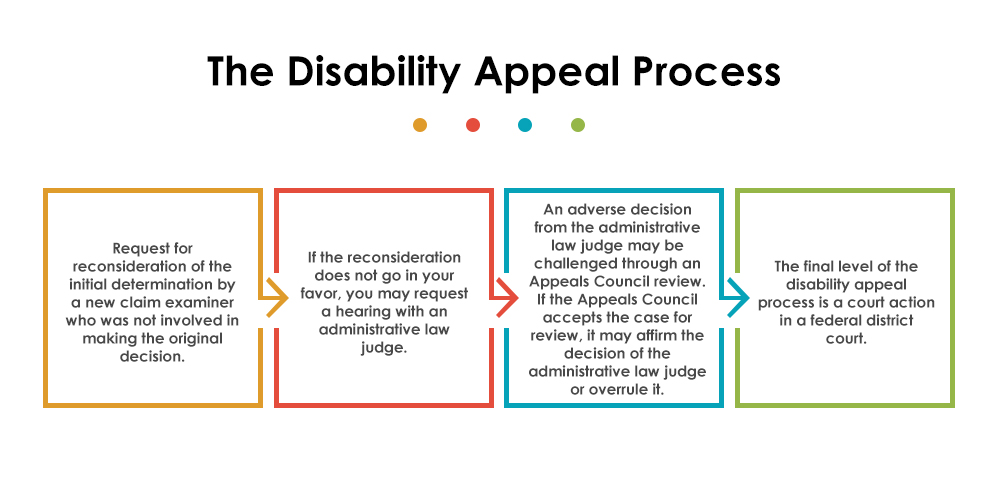A Social Security disability hearing with an administrative law judge is the second level in the appeal process. If you are at this level in the appeal process, you have already waited for your application to go through the initial disability determination process. Your disability lawyer then requested a reconsideration, which is the first level in the appeal process, but it meant waiting even longer.
It’s frustrating to be told to wait after being denied disability benefits that you need to pay bills and living expenses. When your claim is at the hearing level, the waiting continues. First, you must wait for the hearing to be scheduled, and then you wait again after the hearing for the administrative law judge to reach a decision on your claim for benefits, which can take from two to three months, but backlogs and other factors can cause it to be even longer.
Social Security regulations do not set a limit on how long after a disability hearing a decision will be made and sent to you. In order to give you a better idea of what to expect, here is look hearing level process, including how a disability hearing lawyer can help improve both the time it takes and the outcome.

The Disability Appeal Process
A denial of your initial application for Social Security Disability Insurance or Supplemental Security Income or a determination reducing or terminating benefits that you had been approved to receive can be challenged. You have 60 days to request an appeal through a four-level appeal process that includes:
- Request for reconsideration of the initial determination by a new claim examiner who was not involved in making the original decision.
- If the reconsideration does not go in your favor, you may request a hearing with an administrative law judge.
- An adverse decision from the administrative law judge may be challenged through an Appeals Council review. If the Appeals Council accepts the case for review, it may affirm the decision of the administrative law judge or overrule it.
- The final level of the disability appeal process is a court action in a federal district court.
You’re probably reading this because your request for reconsideration did not result in a favorable outcome, so you now have 60 days to appeal by requesting a hearing with an administrative law judge.
Requesting a Disability Hearing
The next level in the appeal process after an unfavorable outcome of a request for reconsideration is a hearing with an administrative law judge. The request goes from a local field office to one of the many Social Security hearing offices for processing before a hearing is scheduled.
At the start of the pandemic, the Social Security Administration stopped scheduling in-person hearings. Instead, hearings were conducted over the telephone or online. It was not until late 2021 that the SSA reintroduced the in-person option. Telephone and online hearings will be scheduled sooner than an in-person hearing until the SSA resumes full in-person operations.
A disability hearing lawyer may be able to expedite the scheduling of the hearing. Otherwise, you and your lawyer will be notified once it has been scheduled. Depending on the number of cases a particular hearing office has to handle, it could take more than a year before you get a hearing date.
Until then, your lawyer will review the claim file and determine what evidence is needed to achieve a favorable outcome. This may include updated medical records, statements from physicians and other medical providers, and statements from employers, co-workers, friends and family.
At the hearing, your disability hearing lawyer has the opportunity to question witnesses, including witnesses called by the administrative law judge. Your lawyer may ask you to testify at the hearing in support of your claim for benefits.
Getting a Decision After the Hearing
A written decision will be issued by the administrative law judge after the conclusion of the hearing. One report from the SSA showed the average time that people waited for decisions was almost a year, but a disability hearing lawyer may be able to reduce the time you wait for a decision. For example, critical or dire need cases qualify for special processing.
Critical cases include the following situations:
- A claimant has a terminal illness that is expected to end in death.
- Veterans with a disability compensation rating of 100%.
- Current or former members of the military with an injury, illness or wound sustained while on active duty.
Dire need cases include those in which a claimant does not have money for food, medicine or medical care.
When a case is identified as critical or dire need, the SSA can expedite the scheduling of a hearing. The time to receive the decision is shortened by the SSA expediting its writing and processing.
Learn More from A Disability Hearing Lawyer
A disability hearing lawyer at Sackett Law works hard to make a difference in the outcome of your disability hearing. Learn more about what we can do for you by contacting us for a free consultation.
A Social Security disability hearing with an administrative law judge is the second level in the appeal process. If you are at this level in the appeal process, you have already waited for your application to go through the initial disability determination process. Your disability lawyer then requested a reconsideration, which is the first level in the appeal process, but it meant waiting even longer.
It’s frustrating to be told to wait after being denied disability benefits that you need to pay bills and living expenses. When your claim is at the hearing level, the waiting continues. First, you must wait for the hearing to be scheduled, and then you wait again after the hearing for the administrative law judge to reach a decision on your claim for benefits, which can take from two to three months, but backlogs and other factors can cause it to be even longer.
Social Security regulations do not set a limit on how long after a disability hearing a decision will be made and sent to you. In order to give you a better idea of what to expect, here is look hearing level process, including how a disability hearing lawyer can help improve both the time it takes and the outcome.
The Disability Appeal Process
A denial of your initial application for Social Security Disability Insurance or Supplemental Security Income or a determination reducing or terminating benefits that you had been approved to receive can be challenged. You have 60 days to request an appeal through a four-level appeal process that includes:
- Request for reconsideration of the initial determination by a new claim examiner who was not involved in making the original decision.
- If the reconsideration does not go in your favor, you may request a hearing with an administrative law judge.
- An adverse decision from the administrative law judge may be challenged through an Appeals Council review. If the Appeals Council accepts the case for review, it may affirm the decision of the administrative law judge or overrule it.
- The final level of the disability appeal process is a court action in a federal district court.
You’re probably reading this because your request for reconsideration did not result in a favorable outcome, so you now have 60 days to appeal by requesting a hearing with an administrative law judge.
Requesting a Disability Hearing
The next level in the appeal process after an unfavorable outcome of a request for reconsideration is a hearing with an administrative law judge. The request goes from a local field office to one of the many Social Security hearing offices for processing before a hearing is scheduled.
At the start of the pandemic, the Social Security Administration stopped scheduling in-person hearings. Instead, hearings were conducted over the telephone or online. It was not until late 2021 that the SSA reintroduced the in-person option. Telephone and online hearings will be scheduled sooner than an in-person hearing until the SSA resumes full in-person operations.
A disability hearing lawyer may be able to expedite the scheduling of the hearing. Otherwise, you and your lawyer will be notified once it has been scheduled. Depending on the number of cases a particular hearing office has to handle, it could take more than a year before you get a hearing date.
Until then, your lawyer will review the claim file and determine what evidence is needed to achieve a favorable outcome. This may include updated medical records, statements from physicians and other medical providers, and statements from employers, co-workers, friends and family.
At the hearing, your disability hearing lawyer has the opportunity to question witnesses, including witnesses called by the administrative law judge. Your lawyer may ask you to testify at the hearing in support of your claim for benefits.
Getting a Decision After the Hearing
A written decision will be issued by the administrative law judge after the conclusion of the hearing. One report from the SSA showed the average time that people waited for decisions was almost a year, but a disability hearing lawyer may be able to reduce the time you wait for a decision. For example, critical or dire need cases qualify for special processing.
Critical cases include the following situations:
- A claimant has a terminal illness that is expected to end in death.
- Veterans with a disability compensation rating of 100%.
- Current or former members of the military with an injury, illness or wound sustained while on active duty.
Dire need cases include those in which a claimant does not have money for food, medicine or medical care.
When a case is identified as critical or dire need, the SSA can expedite the scheduling of a hearing. The time to receive the decision is shortened by the SSA expediting its writing and processing.
Learn More from A Disability Hearing Lawyer
A disability hearing lawyer at Sackett Law works hard to make a difference in the outcome of your disability hearing. Learn more about what we can do for you by contacting us for a free consultation.


Leave A Comment